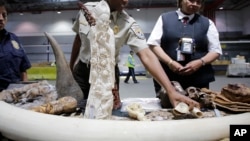Linxun Liao, a citizen of Canada, was sentenced November 12th in U.S. federal court to two years in prison for his role in a wildlife trafficking scheme in which he purchased and smuggled from the United States to China, 16 “libation cups” carved from rhinoceros horns and worth more than $1 million, announced Assistant Attorney General John Cruden for the Environment and Natural Resources Division of the Department of Justice, U.S. Attorney Preet Bharara of the Southern District of New York and Director Dan Ashe of the U.S. Fish and Wildlife Service. Liao pleaded guilty on June 30, 2015, to illegally smuggling rhinoceros horn objects from the United States.
“Each of the ceremonial cups that Liao trafficked represents one step closer to extinction for the rhinoceros, which are steadily being wiped out by poachers for the illegal rhino horn market,” said Director Ashe. “This sentence will serve as a strong warning that we are going to find, arrest and prosecute anyone engaged in this sort of activity and make sure they are no longer able to deprive our children and grandchildren of their wildlife inheritance,” he said.
Liao was arrested in February 2015 as part of “Operation Crash,” a nationwide crackdown on illegal trafficking in rhinoceros horns. Liao was a partner in an Asian art and antiques business located in China. Liao’s role was to purchase items, including wildlife items, in the United States and arrange for their export to China.
Since 1976, trade in rhinoceros horn has been regulated under CITES, a treaty signed by over 180 countries around the world to protect fish, wildlife and plants that are or may become imperiled due to the demands of international markets. Rhinoceros are also protected under the U.S. Endangered Species Act, which further regulates trade and transport.
“This prosecution is the result of a vigorous and ongoing investigation into traffickers profiting from endangered and precious wildlife species,” said Assistant Attorney General Cruden. “We must ensure that the market for antiques and alleged antiques does not also contribute to the extinction of these iconic animals, which could disappear in our lifetimes if we do not act now to stop this illegal trade.”






